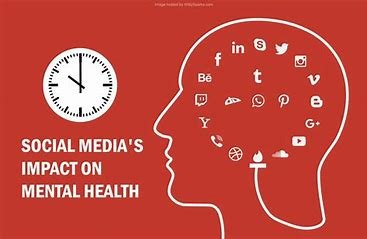The impact of social media on mental well-being is a topic that has gained significant attention in recent years. While social media platforms have the potential to bring people together and provide opportunities for connection, they also come with risks and negative consequences that can affect mental health. The effects of social media on mental well-being are complex, as they can both positively and negatively influence individuals depending on how they use these platforms.

Let’s explore the various positive and negative impacts that social media can have on mental well-being, as well as some strategies for managing its use.
Positive Impact of Social Media on Mental Well-Being
- Social Connection and Support
- Social media allows people to stay connected with family, friends, and communities across the globe. This can be especially beneficial for individuals who are geographically distant from their loved ones or those who have difficulty meeting in person.
- Online support groups: Many people find comfort in participating in online support communities for mental health, chronic illness, or other life challenges. Sharing experiences with others who understand can foster a sense of belonging and reduce feelings of isolation.
- Social media platforms provide opportunities for connection with like-minded individuals, groups, or organizations, which can help improve one’s sense of identity, self-worth, and mental health.
- Access to Information and Resources
- Social media has become an important tool for raising awareness about mental health issues. It provides access to resources, mental health campaigns, and educational content, helping reduce stigma and providing people with the tools to seek help.
- Mental health professionals and organizations share helpful tips, coping strategies, and resources for individuals experiencing mental health challenges, which can provide comfort and guidance.
- Inspiration and Positivity: Motivational quotes, fitness challenges, or mental health awareness campaigns on social media can offer inspiration and encouragement for some people. Positive content may help individuals feel motivated and uplifted.
- Creative Expression and Self-Exploration
- Social media can offer a platform for self-expression and creativity. Users can share their hobbies, passions, and talents through photos, videos, or written content, which can boost self-esteem and provide a sense of accomplishment.
- For some, platforms like Instagram, TikTok, or YouTube allow people to create content and build a community around shared interests, enhancing their sense of purpose and identity.
Negative Impact of Social Media on Mental Well-Being
While social media has its benefits, it can also have significant negative effects on mental health, especially when used excessively or in unhealthy ways. Here are some of the key risks:
- Social Comparison and Low Self-Esteem
- Social comparison is one of the most common negative effects of social media. People often compare their lives to the highly curated and filtered lives of others, which can lead to feelings of inadequacy, jealousy, or low self-esteem.
- Posts that showcase idealized versions of reality, such as perfect bodies, luxurious vacations, or successful careers, can make users feel that their own lives are lacking in comparison. This can contribute to feelings of depression, anxiety, or body image issues.
- Research has shown that exposure to idealized images on social media can worsen body dissatisfaction, particularly among teens and young adults. Constantly seeing unattainable beauty standards can negatively impact self-worth and body image.
- Cyberbullying and Harassment
- Cyberbullying is a major concern, especially for young people. Social media platforms provide an anonymous space for people to engage in harassment, bullying, or negative comments. This can have serious consequences on mental well-being, leading to anxiety, depression, and in extreme cases, even suicidal ideation.
- Victims of online bullying may experience feelings of powerlessness, social isolation, and fear, leading to a significant decline in mental health.
- Addiction and Overuse
- Social media addiction is a growing concern, with individuals spending excessive amounts of time on platforms like Facebook, Instagram, TikTok, and Twitter. The constant need for validation, likes, and followers can create a cycle of dependency, impacting mental well-being.
- Excessive use of social media can lead to disrupted sleep patterns, as people stay up late scrolling through their feeds. Poor sleep quality can contribute to increased stress, anxiety, and mood disturbances.
- Dopamine-driven feedback loops: Social media platforms are designed to be addictive, with features like likes, comments, and shares providing instant gratification. Over time, this can cause users to feel anxious if they don’t receive enough validation or engagement.
- Fear of Missing Out (FOMO)
- Social media fosters a fear of missing out (FOMO), where individuals feel anxious or left out when they see others attending events, enjoying vacations, or having experiences they perceive as more exciting or fulfilling than their own.
- FOMO can cause social anxiety and feelings of loneliness when individuals feel disconnected from their friends or social groups, leading to mental health struggles.
- Decreased Face-to-Face Interactions
- Excessive time spent on social media can result in decreased real-life interactions. Social isolation can contribute to loneliness, depression, and anxiety.
- Although social media can offer a sense of connection, it often lacks the depth of in-person relationships. Genuine human connection, emotional support, and nonverbal cues that occur in face-to-face interactions are harder to replicate online.
Managing the Impact of Social Media on Mental Well-Being
To ensure that social media has a positive rather than negative effect on mental health, here are some strategies for managing its use:
- Limit Screen Time
- Set boundaries around how much time you spend on social media each day. Use tools or apps that track and limit your screen time to avoid mindless scrolling.
- Schedule social media detoxes, whether it’s for a few hours, a day, or longer, to allow yourself a break from constant online engagement.
- Curate Your Feed
- Follow accounts that provide positivity, inspiration, and mental health resources. Unfollow or mute accounts that cause feelings of comparison, anxiety, or low self-esteem.
- Curating your social media feed can help promote a healthier online experience and reduce exposure to negativity.
- Be Mindful of Social Comparison
- Remind yourself that what you see on social media is often a curated version of reality. People tend to post only the highlights of their lives, which can be misleading and unrealistic.
- Focus on your own growth and achievements rather than comparing yourself to others. Practice gratitude and self-compassion.
- Engage in Real-Life Connections
- Make time for face-to-face interactions with friends and loved ones. Physical socialization provides emotional benefits that online interactions can’t replicate.
- Seek out supportive communities—whether online or offline—that foster positivity, connection, and mental well-being.
- Practice Mindfulness and Mental Health Awareness
- Engage in mindfulness practices to help you stay grounded and present in the moment. This can help combat negative emotions triggered by social media use.
- Stay informed about the impact of social media on mental health and take proactive steps to protect your well-being.
- Report Negative Content
- If you encounter cyberbullying, harassment, or harmful content, don’t hesitate to report it to the platform. Many social media companies have tools in place to handle such behavior.
- Protect yourself from online harm by blocking or muting users who engage in harmful behavior.
Conclusion
The impact of social media on mental well-being is a double-edged sword. While it can provide a sense of connection, support, and inspiration, it can also contribute to feelings of inadequacy, anxiety, and social comparison. The key lies in how we use social media. Being mindful of the content we consume, setting boundaries around usage, and prioritizing real-life relationships are essential strategies for protecting mental health in the digital age.
